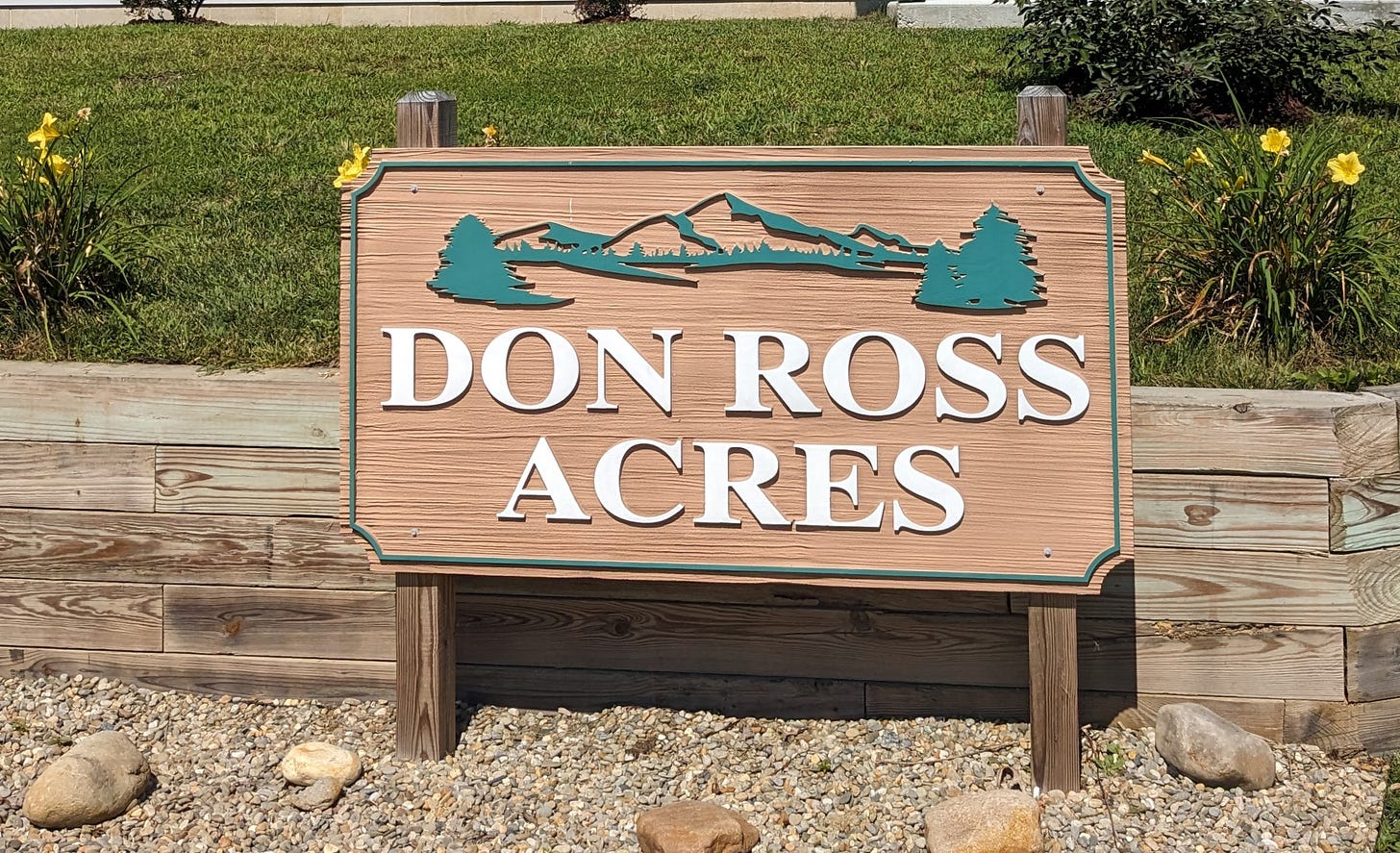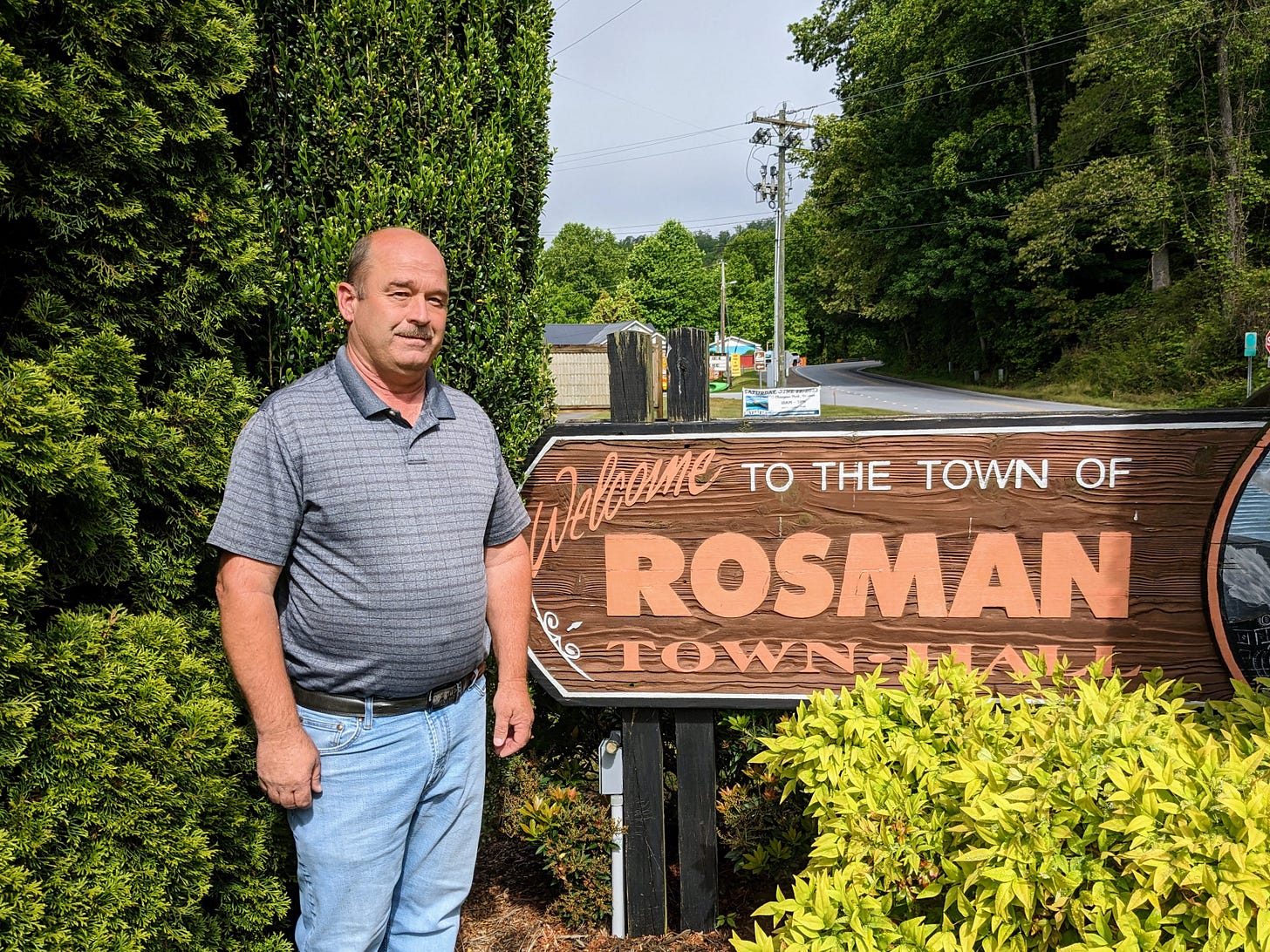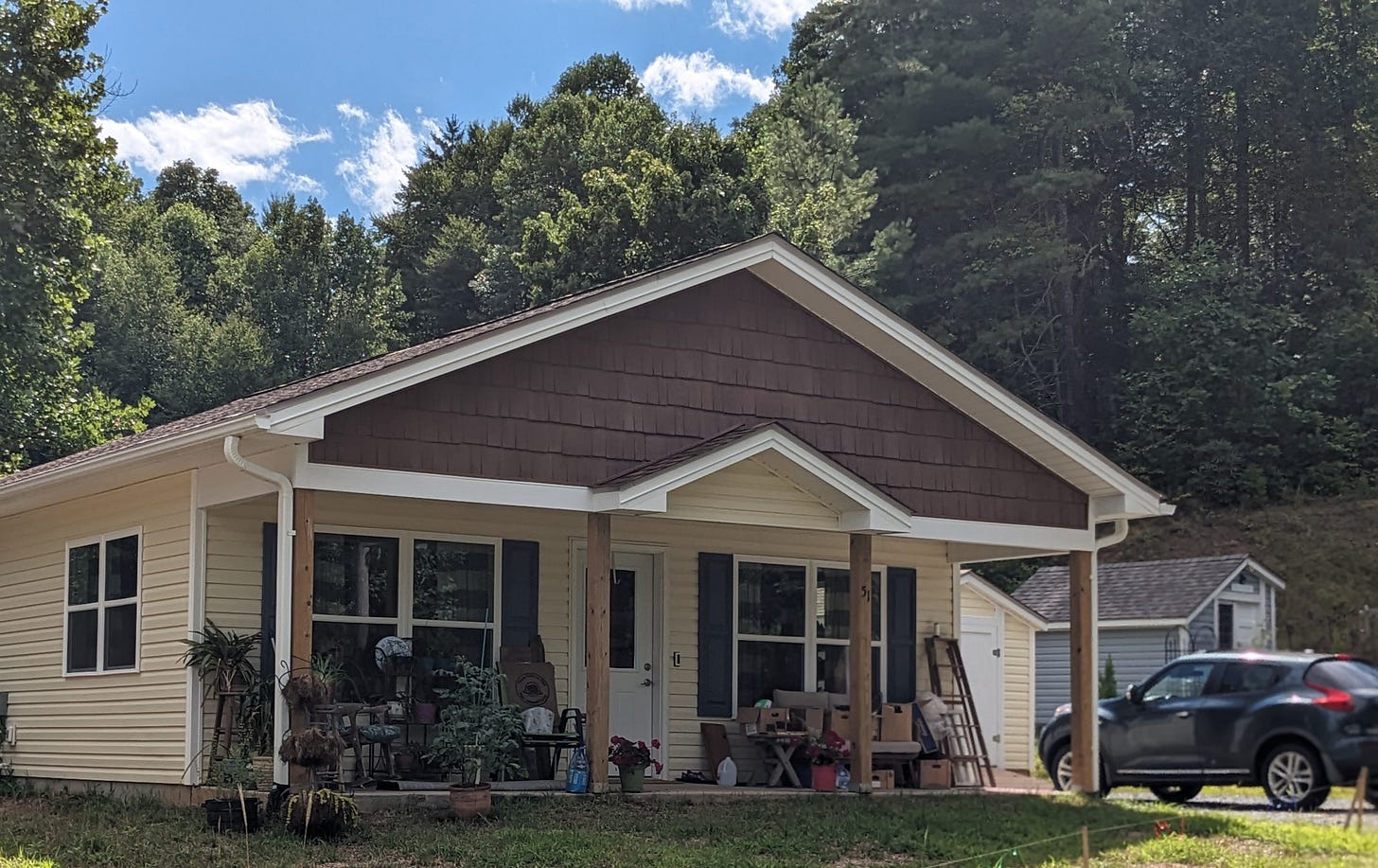Habitat Project Benefits Rosman. And the Mayor
Rosman Mayor Brian Shelton got big returns selling land for affordable homes that required the town to spend on infrastructure. It's good for Rosman, he said, but a political opponent is crying foul.

ROSMAN — Nobody doubts the public benefit of the ten tidy, vinyl-sided homes that Transylvania Habitat for Humanity is building off Old Rosman Highway.
The nearly completed project, called Don Ross Acres, is adding much-needed value to the town of Rosman’s tax base, Mayor Brian Shelton said. And with soaring rents and home prices squeezing out long-time residents, he said, it was an easy call on the town’s part to spend about $92,000 on infrastructure “so Habitat could promote affordable housing in Rosman.”
But the deal also appears to have benefited Shelton.
He bought the 5.1 acres that now includes the Habitat project for $27,000 in 2016. Three years later he sold ten lots to the organization for $175,000 and, in 2021, another three lots to a private developer for $30,000, bringing his total proceeds to more than seven times his purchase price.
Don Ross couldn’t have been built without the infrastructure improvements provided by the town, said a former Habitat official who helped negotiate the deal, and Rosman sent letters to the organization signed by Shelton pledging to complete the road work and waive the fees usually levied to tap into water and sewer lines in December of 2019, two days before the sale closed.
Shelton’s blending of public and private business are not clear violations of state corruption laws, and the cost of the paving and utility work are well below the amount that requires a formal public bidding process, according to a law professor at the University of North Carolina Chapel Hill’s School of Government.
But the deal does highlight other legal deficiencies in the town’s operation.
Shelton said that he routinely grants waivers of tap fees to deserving customers such as Habitat — a practice forbidden by state law, the professor wrote. There’s also no record the town has complied with a law mandating that local governments adopt a code of ethics to guide the conduct of elected officials.
That’s one issue raised by Ricky Traylor, who is challenging Shelton in a heated race for mayor. The bigger one is the cozy relationship between the town’s Board of Aldermen — which includes Shelton’s wife, Deedra — and the mayor, who also serves in the paid position of town administrator.
Board members have allowed Brian Shelton to devote his energies to jobs, such as the improvements to the Habitat parcel, that are intended to “line his own pockets,” Traylor said, and the limited public discussion of the town’s contribution to the project is a prime example of the free rein Shelton has been granted to conduct town business.
“He can spend the town’s money the way he sees fit,” Traylor wrote in a letter distributed to residents, and “aldermen who have served under him have allowed Shelton to do just that with apparently no oversight or objections.”
The Deal
A previous owner of the Habitat property, Joe Parrish, said his since-deceased mother bought it decades ago as a family refuge from Florida summers.
Parrish sold the 5.1 acres for $27,000 in 2016, he said, because he didn’t think it could be used for anything more than, maybe, the site of a double-wide mobile home.
The family’s cabin on the land was “falling in” and nearly worthless, Parrish said in an interview from his home in Brevard County, Fla. Obstacles to developing the property included steep slopes, a deep ravine, and access limited to a narrow gravel road.
When he recently viewed the parcel on Google Earth, he said last month, “I said to my wife, ‘This is really weird. It looks like the whole property has been cleared and leveled out and they are getting ready to build on it.’ . . . I won’t say I was surprised, but it must have taken a lot of excavating and filling in.”
Yes it did, said Don Campbell, the recently retired president and chairman of the board of Transylvania Habitat, who added that Shelton leveled ground, hauled in fill dirt and installed riprap to stabilize the walls of the ravine.
“There was major excavation work,” Campbell said. “He (Shelton) turned that property upside down.”
Shelton, a skilled heavy equipment operator, said he personally did most of this work, including the construction of road beds, using leased equipment at no cost to the town.
“I built the roads,” he said. “It took beaucoups of time. Some of the neighbors probably got tired of me being down there. In fact, I know they did.”
Which brings up one of Traylor’s objections. Shelton was allowed to devote many hours to this project — and, later, to the grading of a parcel he planned to sell the town as the future site of a water treatment plant — while being paid $46,800 annually as the town’s full-time administrator.
“He punches the clocks and then goes over to work on his own property,” Traylor said.
It’s not that simple, Shelton said. Because his position is salaried, he doesn’t punch a clock. He takes vacation or sick days during extended stretches he spends on non-town jobs, he said. And he more than makes up for shorter spells of outside work with his around-the-clock service to the town, such as repairing a water-line leak on the Fourth of July, he said.
“I always work more than 40 hours a week.”
“Needle in a Haystack”
Rosman’s contributions to the Don Ross project included the paving of roads in and leading to the development — after the right-of-ways had been deeded to the town at no cost, Shelton emphasized. The town also waived tap fees and extended utility lines to the property from previously existing pipes.
In response to Traylor’s comments about lack of oversight, Shelton said there was ample (if undocumented) public discussion of this work, and that, because of the wide latitude Aldermen granted him as town administrator, there really didn’t need to be.
The motion to appoint him to the position in December 2011, according to a transcript he provided after listening to a tape of the meeting, directed him to oversee the town’s “property and assets” and gave him control over “long-term financing and capital projects.”
That means, he said, it was well within his authority to spend the $11,567 it cost to extend utility lines to the Habitat property.
“I don’t go before the board if it comes out of the budget. If I exceed the budget, that’s when I have to go ask the Board for more money or a budget amendment,” he said, describing a protocol also followed by the city manager in Brevard, said City Attorney Mack McKeller.
Spending on this extension, as well as the $68,900 cost of the paving, Shelton said, were recorded in monthly spending statements that are approved by the Aldermen at every meeting.
Because the paving was paid for with three years’ worth of state transportation funds allocated to the town, that expense was also listed in annual budgets and could have been addressed at multiple budget hearings, Shelton said, “though I don’t know if anyone specifically asked the question, ‘Why is this money here?’ ”
On the other hand, he said, he made a point of discussing both the paving and the waiving of $12,000 worth of tap fees before the letters pledging this support were sent to Habitat in December of 2019. He did so, he said, not because it was required by town policy, but because of the sensitive nature of his interest in the land.
“I wouldn’t have sent a letter to Habitat saying we are going to pave it if the Board hadn’t had those conversations,” he said.
Documenting that these talks happened in public is difficult because of the limited resources available to the town of about 700 residents, said both Shelton and longtime Town Clerk Angela Woodson. The recorded minutes are typically brief and kept in loosely organized folders. Locating records of meeting discussions, Shelton said, can be “like finding a needle in a haystack.”
But neither Shelton’s nor NewsBeat’s review of all the minutes of the Aldermen’s 2019 meetings revealed any documentation of members talking about letters to Habitat.
Alderman Jared Crowe, who took issue with the facts in Traylor’s letter in a heated exchange at this month’s Board meeting, said he remembers talking to Shelton about the paving and utility work, but not whether he did so privately or in public.
Considering the long-term tax proceeds that will be generated by Don Ross, he added, he has no problem with the town’s contributions, comparing them to tax breaks offered by local governments to companies that offer well-paid jobs.
“Those are incentives that pay for themselves going forward,” he said.
Regardless, the issue should have been discussed publicly, Alderman Larry Bullock said. Because he lives near the Habitat project, he said, he was aware of the paving but doesn’t remember the Board approving it.
“Personally, I think we should have been talked to about it,” he said.
The State’s Rules
North Carolina law and a professional code of ethics address the conduct of officials like Shelton and situations like the Habitat transaction — just not exactly like them.
A state law requires public approval of spending on construction projects after a competitive bid process — but only if the estimated cost of the work is higher than $500,000.
Another North Carolina statute forbids elected officials and employees “from receiving a direct benefit from a contract with the local government unit that the public officer or employee serves,” Crista Cuccaro, a lawyer and a Teaching Assistant Professor of Public Law and Government at the School of Government, wrote in an email.
It’s not clear, however, that Shelton’s proceeds from the sale of the Don Ross lots would constitute a “direct benefit” under this law, she wrote, or that the letters sent from the town to Habitat amount to a formal contract.
City and county managers in the state agree to abide by a professional code of ethics stating “members should not invest . . . in any financial business, commercial, or other private transaction that creates a conflict of interest, in fact or appearance with their official duties.”
But Shelton, as an administrator, is not the staff leader of a public body that has formally adopted a management form of government and is not a member of the North Carolina City and County Management Association, Rob Shepherd, a School of Government employee who serves as the group’s executive director, wrote in an email.
“If you are not a member of the association, the code of ethics doesn’t apply,” he said.
State statutes are clear, however, about the need for a town code of ethics and the legality of waiving tap fees.
A 2009 state law required all local governments in North Carolina to approve an ethics code — either an ordinance or a resolution — by Jan. 1, 2011.
Did Rosman comply?
If so, no code could be found in a folder of the town’s ordinances provided to NewsBeat. Neither Shelton nor Woodson knew an ethics code was required, they said, or if Rosman had ever approved one. Town Attorney Don Barton has been in that role “for probably about 40 years,” he said, and added that it would have been up to the town’s elected leaders to propose such a measure.
“I don’t remember it happening, and don’t know of it happening,” he said. “You’d have to ask the mayor about that.”
Shepherd forwarded an example of such a document from the small coastal town of Sunset Beach, NC, that lays out several guidelines for elected officials, including, for example, “the Mayor and Council should carefully evaluate their non-governmental activities to minimize the risk of conflicts of interest.”
Shelton, making the point in a recent interview that waiving tap fees was not unique to the property he sold to Habitat, began counting on his fingers.
“I gave away one, two, three, four, five,” he said, “probably more than that, maybe up to 10 taps this year.”
Most of these fee breaks compensated property owners for the right-of-way needed to accommodate the ongoing extension of town utility lines in the Rosman Highway corridor. Such compensation is one reason he can decide to waive fees, he said. Promoting affordable housing is another.
Local governments are allowed to reimburse such groups of utility customers from their general funds or other sources, according to a School of Government blog post that Cuccaro forwarded to NewsBeat.
But state law says all utility charges must be based strictly on the amount or type of service provided, the post said, and “a local unit may not discount its utility rates based solely on the status of a customer or customer class.”
Like a “King?”
Shelton said the Habitat project, far from showing his deficiencies as mayor, is an example of how he has helped the town grow since he took office in 2006.
Rosman’s tax base has nearly doubled since then, and its total financial reserves have more than tripled, while its property tax rate has remained unchanged. And the only thing residents need to consider when looking at the Habitat deal, Shelton said, is whether it accomplished a worthy goal at a reasonable price.
If so, the fact that he owned and sold the land “shouldn’t be a problem,” he said. “Really, it should be about what’s best for the town.”
No, Traylor said, the issue is this: Shelton directed town money to a project that allowed him to realize a big return on his investment — and did it with the apparent tacit approval of a compliant Board of Aldermen.
It’s a style of government he would work to change if elected, he said.
If the town does not have a code of ethics, he said, he would push for one to be approved. Given Shelton’s use of his role as administrator and the town’s small size, he favors doing away with the position altogether.
Deedra Shelton, Crowe and other Aldermen loyal to Shelton will likely prevent this, he said, but even so he would keep a close eye on town expenditures and try to contain what he sees as the excessive power granted to Shelton.
“He’s been like a king,” Traylor said.
Email; brevardnewsbeat@gmail.com







I congratulate the mayor for his efforts to provide affordable housing in Rosman.